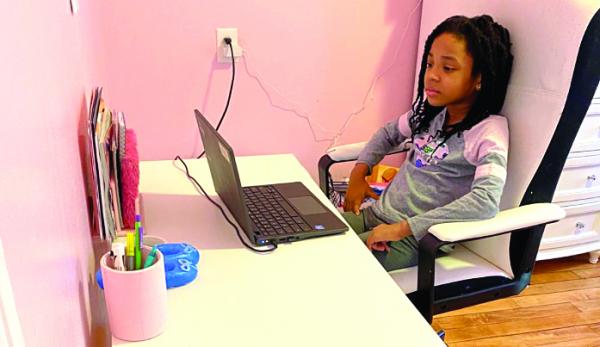February 18, 2021

Avery Burton, Shylanda Johnson's youngest child, attends BPS classes remotely from her Dorchester home. Photo courtesy Shylanda Johnson
hThis article was originally published by WBUR 90.9FM on Feb. 11. The Reporter and WBUR share content through a media partnership.
Even though more public school students will be able to return to classrooms in the coming weeks, some families in communities most deeply affected by the coronavirus are opting to stay remote.
“I had Covid-19; my mom, my dad, my pops, we all had it,” said Shylanda Johnson of Dorchester. “I’m still suffering from the aftermath.”
Johnson — like all of the half dozen families who spoke with WBUR — is scared about what the virus might do to her second and eighth grade kids if they got it.
“Education is number one,” she said. “But also health is, I feel, above that. And there won’t be no education if your child is dead and you have to bury your child.”
Research shows younger children are more likely to get a mild case of Covid-19 or remain asymptomatic.
So far, about 44 percent of Boston Public School families have decided they would remain remote. Another 44 percent have chosen to return their children to classrooms. Many parents told WBUR they had concerns about the coronavirus. Some parents said they liked the consistency of staying remote, particularly so late in the school year when many kids would only gain about a dozen days of in-person learning.
Boston Superintendent Brenda Cassellius said she understands why a lot of parents might be hesitant to send their kids back into a school building. “When they see it first hand and have to endure through it, it of course raises the level of anxiety in a family,” she said. “However, all of the metrics seem to be headed in the right direction.”
Parent hesitancy to return has also been at play in the greater Boston area’s charter schools, which predominantly serve families of color. Most charter schools started the year remotely, in large part because that’s what most of the enrolled families preferred.
“We explicitly reached out to families in Boston and Lynn in December and said we could run a very small program for you if you want to come back,” explained Rhonda “Nikki” Barnes, head of the KIPP Academy Charter Public School network in Massachusetts. “But they said: no, we are nervous about this virus.”
In a more recent survey, about half of KIPP families said they wanted to come back to classrooms. Barnes said the game changer was the availability of surveillance testing. She explained, it’s not enough to talk about formal research studies that show low transmission in schools.
People want to know what’s happening in their child’s school building. With surveillance testing, Barnes believes her team will be able to make a more convincing argument that mitigation efforts are effective.
“We will show how this group of kids came back, how our systems worked,” she said. “And then that means people have more faith in it.”
Faith and trust is something parent leader Shellina Semexant is hearing from other families at KIPP right now: “Can we trust you? How can we trust you?”
Semexant said she’s still nervous that her fourth and sixth grade children might get the virus, but she has decided to let them head back into the classroom this spring.
Some parents said they are encouraged by phased-in re-openings. At KIPP, the schools will only add about a dozen new students each month.
“If your friends are able to go there for one, two, three weeks and nothing happens, then you can also go to be part of it,” parent David Nok Daniel said.
KIPP and Boston Public School leaders hope that improved communication and transparency will also help ease parent fears. Like many public schools across the state, BPS developed an online dashboard for parents to check infection rates in the school buildings and have been sharing information from sanitizing and mask policies to ventilation system upgrades.
But for some parents, that’s still not enough.
“For me, it’s not a trust issue,” said Shylanda Johnson. “Why would we want to send our children back to school when there’s a new strain that entered our area?” Studies are underway to determine how effective the vaccines are against the new variants.
But many school leaders said there are also risks associated with staying remote, such as increased anxiety and depression from the social isolation. And students with certain disabilities are at risk of skill regression and other health issues. That’s why Cassellius says in-person learning needs to at least be an option for families, particularly with how effective the district’s mitigation strategies have been since reopening to additional high needs students in February.
“Knock on wood, we have not yet had a case that’s happened in schools,” said Cassellius. “There’s no 100 percent fool-proof protocol. But all of them together really does act as a pretty strong wall.”
She’s hopeful that as the spring rolls on, more parents will feel comfortable sending their kids back into the classroom.
This article was originally published by WBUR 90.9FM on Feb. 11. The Reporter and WBUR share content through a media partnership.



